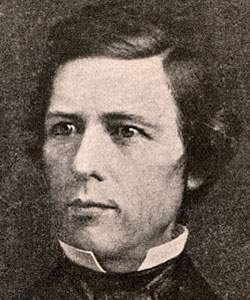David Wilmot (Congressional Biographical Directory)
Reference
WILMOT, David, a Representative and a Senator from Pennsylvania; born in Bethany, Pa., January 20, 1814; completed preparatory studies in the academy at Aurora, N.Y.; studied law; admitted to the bar of Bradford County, Pa., in 1834 and commenced practice in Towanda, Bradford County, Pa.; elected as a Democrat to the Twenty-ninth, Thirtieth, and Thirty-first Congresses (March 4, 1845-March 3, 1851); was not a candidate for renomination in 1850; was the author of the ‘Wilmot Proviso’ relative to slavery in newly annexed territory; took a leading part in the founding of the Republican Party in 1854; presiding judge of the thirteenth judicial district 1851-1861; unsuccessful Republican candidate for governor of Pennsylvania in 1857; elected as a Republican to the United States Senate to fill the vacancy caused by the resignation of Simon Cameron and served from March 14, 1861, to March 3, 1863; was not a candidate for reelection in 1862; member of the peace convention of 1861, held in Washington, D.C., in an effort to devise means to prevent the impending war; appointed by President Abraham Lincoln a judge of the United States Court of Claims in 1863 and served until his death in Towanda, Pa., March 16, 1868; interment in Riverside Cemetery.
"Wilmot, David," Biographical Directory of the United States Congress, 1774 to Present, http://bioguide.congress.gov/scripts/biodisplay.pl?index=W000566.
David Wilmot, Republican Party (American National Biography)
Scholarship
Helping to organize the initial national Republican meeting in Pittsburgh in February 1856, he chaired the platform committee of the Republican nominating convention in Philadelphia later that year. He vigorously campaigned for the party's nominee, John C. Frémont, and the following year ran unsuccessfully for governor. In both instances Wilmot was closely identified with the Republican position of preventing the expansion of slavery, a stance that, because of the influence of Buchanan, who was now president, was not as popular in Pennsylvania as in many other parts of the North. Wilmot's continued opposition to protective tariffs and the still-nascent state of the Republican party further weakened his candidacy.
At the Republican convention in Chicago in 1860, Wilmot supported Abraham Lincoln despite the candidacy of fellow Pennsylvanian Simon Cameron. Considered by Lincoln for a cabinet position, he instead was chosen by the legislature for a short Senate term (1861-1863). There his work was undistinguished and was characterized by loyal support of Lincoln's policies. Supportive of the numerous measures weakening slavery, he took special pleasure in the 1862 law that adopted the proviso's principle and banned slavery in all territories. At the conclusion of his Senate term Wilmot was appointed by Lincoln to be a judge on the newly created Court of Claims, on which he served until his death at his home in Towanda.
At the Republican convention in Chicago in 1860, Wilmot supported Abraham Lincoln despite the candidacy of fellow Pennsylvanian Simon Cameron. Considered by Lincoln for a cabinet position, he instead was chosen by the legislature for a short Senate term (1861-1863). There his work was undistinguished and was characterized by loyal support of Lincoln's policies. Supportive of the numerous measures weakening slavery, he took special pleasure in the 1862 law that adopted the proviso's principle and banned slavery in all territories. At the conclusion of his Senate term Wilmot was appointed by Lincoln to be a judge on the newly created Court of Claims, on which he served until his death at his home in Towanda.
Frederick J. Blue, "Wilmot, David," American National Biography Online, February 2000, http://www.anb.org/articles/04/04-01063.html.





